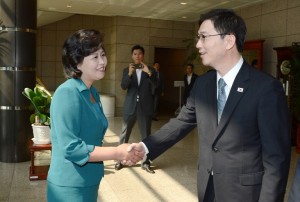High-level North-South Korea talks called off

North Korean chief delegate Kim Song-Hye (L) shakes hands with her South Korean counterpart Chun Hae-Sung (R) before the inter-Korean working-level talks at the truce village of Panmunjom in the demilitarized zone dividing the two Koreas on June 9, 2013. FILE PHOTO
SEOUL — South Korea said Tuesday that North Korea had called off planned talks less than 24 hours before they were due to start in Seoul, following disagreement over who would lead the respective delegations.
They were meant to be the first high-level talks between the rivals for six years, and had been seen as an opportunity to improve relations after months of military tensions and threats of nuclear war.
Unification Ministry spokesman Kim Hyung-Seok said Pyongyang made the decision after it objected to Seoul’s move to name a vice-minister to head its negotiating team.
“North Korea, taking issue with the level of our chief delegate, unilaterally told us that it was postponing the dispatch of its delegation,” Kim said.
It was not immediately clear if the postponement was temporary or indefinite.
Article continues after this advertisementThere was no immediate statement from the North Korean side, but Kim said Pyongyang had made it clear that talks would not take place unless the South sent a “minister-level official.”
Article continues after this advertisementThe North said naming a vice-minister made a “mockery” of the proposed high-level talks and contravened what had been agreed at a preparatory meeting on Sunday, Kim said.
“Such an allegation is absolutely absurd in terms of both common sense and international standards,” he added.
On the proposed agenda was the resumption of two suspended commercial projects, including the Kaesong joint industrial complex which the North shut down in April as the recent crisis peaked.
Although there had been no real expectations of a substantive breakthrough at the talks, the fact they were happening at all had been taken as a positive sign.
North Korea’s third nuclear test in February triggered toughened UN sanctions and led to a cycle of escalating tensions that included threats of pre-emptive nuclear strikes from Pyongyang.
Then in a complete reversal, at the end of last week North Korea proposed opening a dialogue.
Working-level talks followed in the border truce village of Panmunjom on Sunday and the high-level meeting was set for Wednesday and Thursday in the South Korean capital.
But right from the start there was disagreement over who precisely would lead the talks and what would be on the agenda.
“This whole episode just shows how deep the mistrust between the two sides really runs,” said Professor Yang Moo-Jin of the University of North Korean Studies in Seoul.
The move towards dialogue had been broadly welcomed both at home and abroad, but there was always substantial scepticism regarding Pyongyang’s intentions.
Some analysts had suggested the North was paying lip-service to the idea of talks to coincide with the weekend summit between US President Barack Obama and Chinese President Xi Jinping.
China, the North’s sole major ally and economic benefactor, has been under US pressure to restrain its neighbor and has pushed Pyongyang to engage in dialogue rather than seek confrontation.
South Korean President Park Geun-Hye took office in February with a promise of greater engagement with Pyongyang.
But she remains adamant that substantive dialogue on wider issues can only take place if the North shows some tangible commitment to abandoning its nuclear weapons program.
North Korea has been equally emphatic in declaring its nuclear deterrent is not up for negotiation.
Originally posted @ 7:12 p.m.